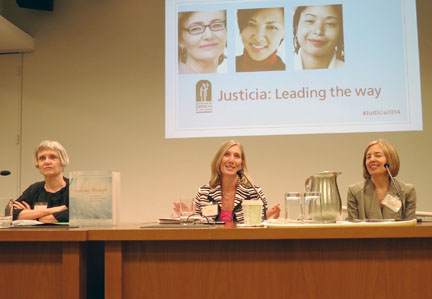A lack of mentorship opportunities, inflexible hours, and not enough support for maternity and parenting were at the forefront of issues discussed at a Law Society of Upper Canada symposium yesterday on the retention of women lawyers in private practice.

The Toronto conference celebrated the public launch of several guidebooks aimed at supporting women lawyers, and giving them the opportunity to discuss gender-related issues that exist in law firms.
About 200 lawyers, most of them women, watched and participated in various talks throughout the day that focused on topics such as finding a mentor, setting goals, and maintaining a practice while on maternity leave.
According to the documents, women account for less than 35 per cent of lawyers and about 20 per cent of partners in private practice. This despite the fact women account for more than 50 per cent of all Ontario law graduates. Women may also face systemic and unconscious biases and attitudes that make private practice more challenging, such as being called on repeatedly to fill positions on firm committees simply because of their gender.
“None of this is meant to say law firms have been the bad guys,” said Barbara Murchie, co-chairwoman of the law society’s retention of women in private practice working group. “It’s not solely up to the law firm to make women associates successful. It’s a joint effort . . . it’s up to women and the law firms to work together to create an environment where they can prosper.”
Since the working group’s launch in 2008, it has introduced a number of positive changes to the law firm environment. ?
Some of its successful programs include maternity leave preparation courses and a contract lawyer registry to sustain a practice while a lawyer is away.
The guidebooks, which contain quotes and advice from many prominent women lawyers across the county, come from The Justicia Project, one of the working group’s nine projects to maintain women in private practice.
“I think we have a duty, as women who raised children while maintaining a position in the profession, to make it easier and better for the generations that are following us,” said Chief Justice Annemarie Bonkalo at the reception following the symposium. “Firms are now taking action in many ways that are making it better and easier for their lawyers to succeed and find balance.”
The next steps for The Justicia Project include updating statistics as needed, offering more CPD hour programs and
To view the new materials, visit the
Justicia site.

 The Toronto conference celebrated the public launch of several guidebooks aimed at supporting women lawyers, and giving them the opportunity to discuss gender-related issues that exist in law firms.
The Toronto conference celebrated the public launch of several guidebooks aimed at supporting women lawyers, and giving them the opportunity to discuss gender-related issues that exist in law firms.